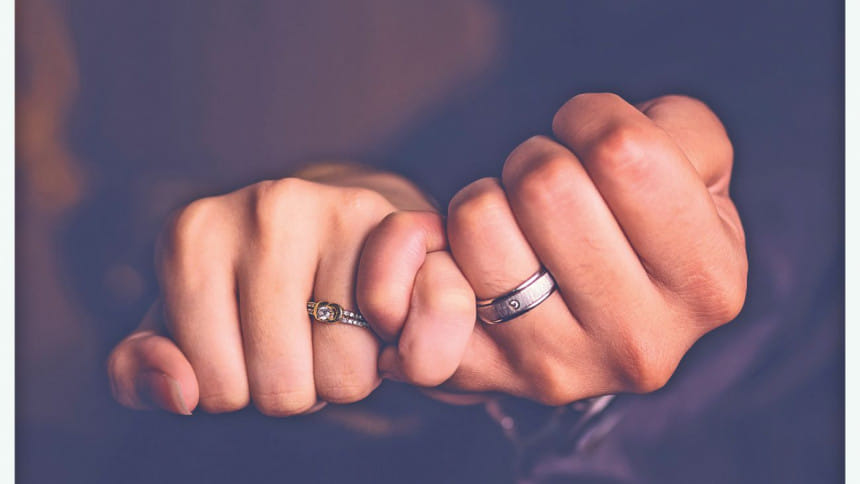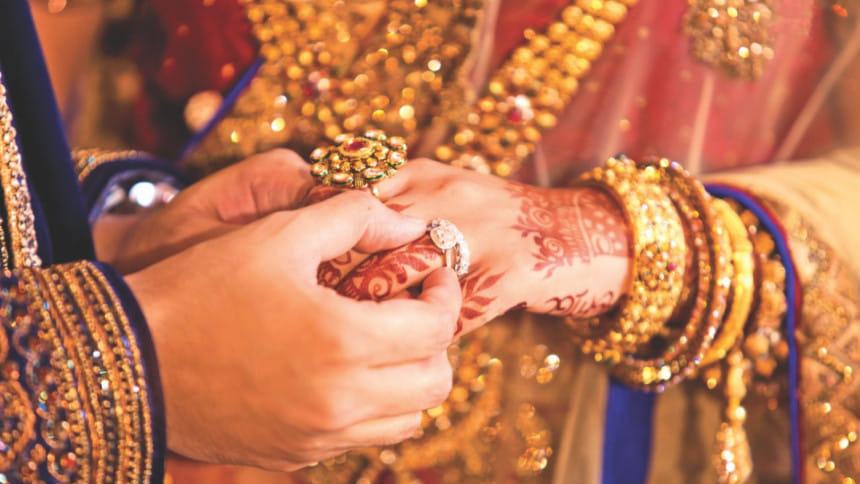The mehr mystery

Weddings anywhere are occasions to rejoice new beginnings, be those seeped in simplicity or wild extravagant fanfare. But apart from the elements of gaiety and the obvious joy and lifestyle change for the couple and their families, there are also legal aspects pertaining to the official side of the union of two people.
The most important element of a Muslim wedding is the Nikah, or the marriage contract; it may surprise many that marriage in Islam is not fundamentally a spiritual or heavenly bond, but a social contract, which can be drawn to include any special clauses agreed upon by the respective spouses. Also, it can be systematically ended or annulled.
One of these supremely important and often misunderstood clauses is that of the 'mehr,' the closest translation being dower, although it has some quite significant differences.
The primary stated purpose of the mehr is to provide the wife with a sum of money to tide over untoward situations, or create a level of financial independence.
This latter part may feel redundant to the modern woman who earns for herself, and is often fully capable of running the entire household. This is where it becomes important to understand the symbolic element of the mehr — a demonstration of the man to show his willingness to shoulder the responsibility of the woman and their family, as ordained by God.
Mehr is a right given to women by Allah, as clearly stated in Surah Nisa [The Woman]—
"And give the women (on marriage) their mehr generously."
The wife remains unobligated to perform her marital duties unless the mehr is paid, or the time or method of payment is agreed upon. (Ömer Nasuhi BILMEN, Hukuk-i Islamiyye Kamusu, Istanbul 1967)
WHAT MEHR IS
It is a gift of cash or wealth in kind that is given to the bride upon her marriage, from the husband, as a part of the marriage contract and must be paid to fully ratify the same.
WHO GETS MEHR
All Muslim women, and per some scholars even "people of book that Muslim men marry" who enter into a marriage with a Muslim man, be it for the first time, as a divorcee or as a widow, have the right to receive mehr, and use it just as they please, without coercion by any other person. No one is exempt from paying mehr, as demonstrated by this ayat, "O Prophet, We have made permissible for you the wives whose dower you have paid…" (33:50).
Mehr is the bride's sole right and personal property. That also means that she has the right to decide on the amount and payment method, and this is where most of our society fails to ensure the woman's right.
Neither the father, nor the husband, nor any other relative male or female has any right over the mehr amount unless specifically given by the woman. It is also thereby wrong to not let her be a part of the mehr discussion under any pretenses of modesty, or propriety.

HOW MUCH IS THE MEHR
There is no minimum or maximum limit for the mehr, although different schools of Islamic thought do provide certain numbers by adjusted historic amounts for their modern day equivalents, but that is a conversation for the scholars, well out of my limited purview.
To be brief with just one example, the mehr of the wives of the Prophet (S) was about 1487.5 grams of silver, and is sometimes recommended to be the modern day price of the same (Muqaddimah Ibn Khaldoon).
That being said, there are certain things that are supposed to factor in while deciding the amount of mehr, including the social, financial and personal standing of the bride and groom.
It is the right of the bride and groom or their representatives to fix an amount upon discussion freely, and it has no limit. The couple can decide for a portion of it to be paid on the wedding day, often in the form of jewellery in Bangladesh, and the rest to be deferred for later. This system is called 'mehr musamma.'
In case the mehr is not decided before the wedding, it cannot be escaped or written off, and a system called 'mehr al-misl,' or one decided by comparison, is used.
The comparison is done by considering the mehr of an equivalent woman, in terms of the family and relatives of the woman, her age, beauty, wealth, intelligence, piety, previous marital status, education and knowledge, behavior, and even the number of existing children (if any), scholars say.
All being said, the mehr should be fixed keeping in mind the financial capacity of the groom, and the grooms should keep it in mind that this capacity includes their future potential and not just the current status.
It should also be kept in mind that the Prophet (S) is reported to have said that the best nikah is the one that does not place a burden on any party, and is also reported to have allowed a wedding with as little as a simple iron ring, to a nugget of gold as small as a date-stone, or the knowledge of the Quran as per agreement of both parties, to something as high as 500 dirhams for his own daughter Fatimah (R), now known as Mehr-e-Fatimah.
If a man wants to give a large sum in mehr, it is completely acceptable unless the demand or payment is done with the intention of extravagant show-off, and is clear in the Qur'an's use of the word "qintar", which means "a large measure (of property)."
It is a mockery to fix unrealistically huge sums of money, or to enter the contract without the intentions of paying it. The opposite, of fixing a ridiculously small amount is also similarly in contempt of God's laws. The mehr is so important, that it has to be paid as a debt from a deceased man's estate before the heirs can receive any of it.
The one caveat that makes it permissible for the man to receive back the paid mehr is in the occasion of "khula," or when the woman divorces a man, and yet jurisprudence may arrive at different answers to each individual case. There are also many layers of complexities with regard to mehr, marital relations, and the dissolution of a marriage, but that is for another day.
Sometimes, we find that people, knowingly or otherwise, make a mockery of this mandatory requirement of an Islamic marriage. There can be crude explanations for the need of mehr for crude people, and decent explanations for the decent, yet it remains obligatory for all who enter into a marriage. Just as mandatory mehr is for a Muslim wedding, similarly strictly forbidden is dowry, be it hinted, coerced or forced, cash or kind payments made to the groom. May all marriages be conducted in good faith, and with the correct conditions.
Photo: Prito Reza, Wedding Diary Bangladesh

 For all latest news, follow The Daily Star's Google News channel.
For all latest news, follow The Daily Star's Google News channel. 



Comments